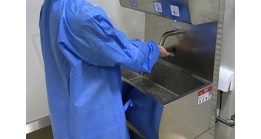SAVE LIVES – Clean Your Hands
Each year, on 5 May, WHO celebrates the World Hand Hygiene Day, in the context of the WHO “SAVE LIVES: Clean Your Hands” campaign. The aim of this global campaign is to bring people together in support of hand hygiene in health care improvement and thus, impact positively on the quality of care and patient safety across all levels of the health system.
The slogan for World Hand Hygiene Day 2023,“Accelerate action together”, is fogcused on the idea that together, we can accelerate action to prevent infections and antimicrobial resistance in health care and build a culture of safety and quality in which hand hygiene improvement is given a high priority.

Hand hygiene is also pivotal on maintaining clean and hygiene for food. Hand hygiene to prevent cross contamination and ill influence on the performance of the products.
When to Wash Your Hands
Personnels in the food production plant, including those wearing gloves, should clean their hands regularly, especially when personal cleanliness may affect food safety. In particular they should wash hands:
l at the start of food handling activities;
l when returning to work after breaks;
l immediately after using the toilet; and
l after handling any contaminated material, such as waste or raw and unprocessed foods where this could result in contamination of other food items.
How to Wash Your Hands
In order not to contaminate food, personnel should wash hands with soap and water and rinse and dry them in a manner that does not recontaminate the hands. Hand sanitizers should not replace hand washing and should be used only after hands have been washed.
What to do for Washing Hands
The frequent use of a hand wash system is an essential means of achieving proper hand hygiene, and this is where hygiene stations come in handy.
Firstly, Hygiene stations offer a centralized location to wash hands. A hygiene station is usually strategically placed in high-traffic areas, making access to it easy and convenient. When a hygiene station is present, individuals are less likely to skip washing their hands since they can easily access the necessary hand washing tools. This ultimately translates to reduced germ transmission and improved hygiene within a facility.
Secondly,having a hygiene station hand wash system promotes compliance with hygiene standards. Hygiene standards dictate specific guidelines that govern hand hygiene, and having a designated hand washing area with all the necessary hand washing tools ensures that individuals adhere to these standards.
Thirdly, hygiene stations are cost-effective alternatives to individual handwashing sinks with individual hand drying, hand disinfector. While having individual sinks may be more convenient, it is often not feasible, especially in facilities with limited space.
In conclusion, maintaining proper hand hygiene is essential for preventing the spread of illnesses and maintaining overall hygiene. Hygiene stations provide a centralized location for hand washing, offering all necessary tools for effective hand hygiene. The benefits of using a hygiene station hand wash system include improved compliance with hygiene standards, convenience, cost-effectiveness, and customizability. Ultimately, the use of hygiene stations is the most effective means of ensuring proper hand hygiene in food production plants. So, clean your hands and use hygiene stations to stay healthy!


